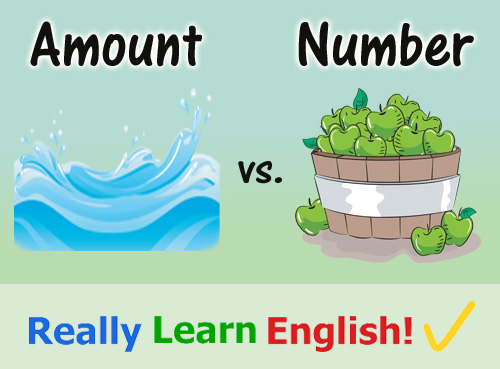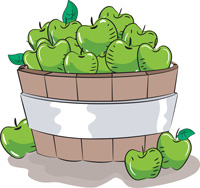Amount vs. Number
What is the difference?
Students of English are often confused about the difference between the words amount and number. How do you know when to use each one?
Both amount and number are nouns that refer to the quantity of something. Both words can also be used as verbs that mean "to be a certain quantity" or "to add up to." Although they are similar, the two words are not interchangeable.
They are used in completely different contexts and, for English speakers, the distinction is very clear. It is important to learn the difference between amount and number, both as nouns and as verbs, because if you mix them up it's considered quite a basic mistake.

Let's look at some examples to help you understand the difference.
Click Here for Step-by-Step Rules, Stories and Exercises to Practice All English Tenses
Amount
When it is a noun, the word amount is used with two types of words. First, we use amount with things we can't count (or do not usually count). For example, we cannot count water, flour, snow or rain, and we do not usually count rice or hair. For this reason, we describe an amount of water, an amount of flour, an amount of rice, etc.

Keep in mind that the concept of counting these things is different from the concept of measuring these things. We can measure flour, but we cannot say "one flour, two flour, three flour…" This means that flour cannot be counted. Similarly, we cannot count money and time. We can count dollars, euros, pounds, and other types of money, but we cannot say "one money, two money, three money…"Therefore, we speak about an amount of money and an amount of time.

Besides uncountable nouns, amount is used with abstract concepts. We speak about the amount of love people feel for each other, the amount of pride and the amount of frustration, noise, work and other ideas and emotions.

Amount can also be a verb. When it is used in this sense, as when it is a noun, amount is followed by an uncountable noun. The meaning of the verb to amount to is "to be a certain amount."

Collocations
You have probably already noticed that when it is a noun, amount is followed by "of." When it is a verb, amount is followed by "to."
Examples:
- You should only eat a small amount of sugar each day.
(The quantity of sugar you eat in one day should be small.) - Is that a good amount of olive oil to put in the salad, or is it too much?
(Is that a good quantity of olive oil to put in the salad?) - The amount of time and effort required to learn another language is considerable.
(Learning another language requires a big quantity of time and effort.) - An enormous amount of work went into the project.
(Completing the project required a lot of work.) - Combined, my salary and my husband's salary amount to about $6,000 per month.
(Put together, my salary and my husband's add up to about $6,000 per month.) - The money I have to pay in rent and bills amounts to quite a lot.
(The quantity I have to pay in rent and bills is quite a lot.)

Number
When used as a noun, the word number refers to a quantity of something that can be counted. Examples of things we can count are people, apples, mobile phones, photographs, jobs and animals.
For this reason, we speak about a number of people, a number of apples, a number of mobile phones, etc. Note that although we speak about an amount of time, we speak about a number of times (as in once, twice, three times…) This is because "time" can be both a countable and uncountable noun.

Sometimes people use the expression "a number of" when they want to avoid being specific about the quantity in question. In this case, the expression means "some" or "several." When using the expression "a number of," the noun that follows number will always be plural.
Similarly, when this noun is followed by a verb, the plural form of the verb should be used. For example, we say, "a number of apples in the bowl are green," not "a number of apples in the bowl is green."

When it is used as a verb, number means "to be a certain number." As when it is a noun, the verb "to number" must be followed by a countable noun.

Collocations
Similar to amount, when it is a noun the word number is followed by "of."
When number is a verb, it is generally used to speak about large, approximate numbers, particularly crowds of people. For example, we could say, "The crowd numbered in the tens of thousands" or "The protesters numbered in the hundreds."
In this case, the verb number is followed by "in." When we speak about an exact number, or a number about which we have more certainty, "in" is not necessary. For this reason we say, "The population of England numbers 53.1 million people." (Not "numbers in 53.1 million people.")

Examples:
- The number of languages spoken in London is astonishing.
(The quantity of languages spoken in London surprises many people.) - The number of people with college degrees has been increasing over the last few years.
(More and more people are getting college degrees.) - I was expecting 20 people at the party, but a number of my friends cancelled at the last minute.
(I thought 20 people would come to the party, but in the end some of my friends were unable to attend.) - Jonathan worked for a number of different companies before finally finding one he liked.
(Jonathan worked at several other jobs before he finally found one he liked.) - Madonna's fans number in the millions.
(Madonna has millions of fans.) - The crowd at last night's football game numbered in the tens of thousands.
(There were tens of thousands of people at last night's football game, although it's impossible to say exactly how many people were there.)
Tips
Tip 1
After both amount and number, it is not necessary to use the word "the." For example, you would say, "I am happy about the amount of money in my piggybank." (Not, "I am happy about the amount of the money in my piggybank.")

Tip 2
For both countable and uncountable nouns, it is possible to use quantity instead of amount or number. For example, we could say, "Due to the snowstorm, there is an enormous quantity of snow on the street." We could also say, "Only tiny quantity of people passed the exam." Keep in mind that quantity is more formal than amount and number.

A Story to Practice Amount vs. Number
Jenny has been at her job for a number of years. She was very happy working for her company at first, but these days there are a number of reasons why she isn't satisfied. First, the amount of time she spends at the office has been increasing. This is because the number of people in her department has decreased. (Fewer people to do things amounts to more work for everyone!)
Second, Jenny is under an incredible amount of pressure. Last month, she stayed late on a number of evenings just to get things done. Finally, she has had a number of arguments with her boss. Jenny is beginning to feel that the amount of money she earns is actually quite small.
Jenny is exploring a number of other options. She is considering setting up her own company. Doing so would involve a considerable amount of work, but it would probably be more enjoyable than her current situation. Another idea is to go back to school.
Tuition fees would amount to quite a lot of money, but the cost would probably be worth it. Finally, Jenny is thinking about taking some time off to travel. She thinks a vacation will help her deal with the enormous amount of stress she has been experiencing.
Jenny has been caught daydreaming about this last idea on a number of occasions. In fact, the number of hours she has spent daydreaming probably number in the hundreds! She mostly imagines lying on a hammock in the Caribbean, or going on a safari. It depends on the day! She has an endless amount of ideas about how to spend her free time.

Quiz
Answer the following 10 questions and then check your answers. Each question is worth 10 points.
Part 1:
- With which of the following options would we use the word amount?
- people
- flowers
- coffee
- bananas
- With which of the following options would we use the word number?
- jealousy
- friends
- homework
- sunshine
- Which sentence is written correctly?
- A number of famous people were at the event.
- Please add a large number of milk to my tea.
- I am under an incredible amount for stress.
- The change in my pocket amounts about $10.
- Which of the following is written incorrectly?
- Most parents feel an enormous amount of pride in their children.
- Doing 30 minutes of exercise a day amounts to nearly 4 hours a week.
- There seem to be a number of mosquitoes in the house.
- I can't tell you the number of time I've lost my keys.
Part 2:
- Which of the following is true about amount and number?
- Amount can sometimes be used as an adjective.
- Number is a noun, but never a verb.
- Both words are used to describe quantities.
- Amount is followed by "of" but number is followed by "with."
- Which of the following is NOT true about amount and number?
- Both words are both nouns and verbs.
- Amount is used with abstract concepts and ideas.
- Number is used with countable nouns.
- Amount is more formal, and number is less formal.
Part 3:
- In the United States, the average __________ of children per family is 1.87.
- amount
- number
- amounts
- numbers
- Cathy felt an unbelievable __________ of anger on learning she'd been lied to.
- amount
- number
- amounts
- numbers
- You wouldn't believe the __________ time I spend answering email.
- amount to
- amount of
- number in
- number of
- The people in the stadium __________ the tens of thousands.
- numbered
- numbered of
- numbered in
- numbered to
Answer Key
Part 1: 1. C | 2. B | 3. A | 4. D
Part 2: 1. C | 2. D
Part 3: 1. B | 2. A | 3. B | 4. C
Get Updates, Special Offers, and English Resources
Download your FREE GIFT (the first two chapters of
English Short Stories Book and Workbook)
as soon as you join!

By submitting your email, you consent to receiving updates and newsletters from us and to the sharing of your personal data with third parties for the purposes of sending you communications. We will not spam you. You can unsubscribe at any time. For more information, please see our privacy policy.





